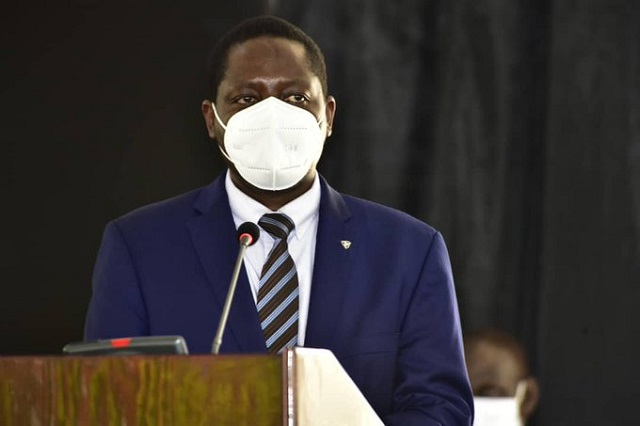
Kampala, Uganda | THE INDEPENDENT | The Ministry of Finance has unveiled a 40.7 trillion Shillings budget for the financial year 2021/2022. The proposed figure is less of the current budget by 11 trillion Shillings.
Parliament initially approved 45.49 trillion Shillings budget for the current financial year which started on July 1, but this has since shot up due to several COVID-19 loans and supplementary budgets. It now stands at 51 trillion Shillings.
State Minister for Finance David Bahati says that 21 trillion Shillings from next years budget is expected to come from domestic revenues. He says that despite numerous reforms, domestic revenue mobilization is still below the economy’s potential yet Uganda’s public expenditure is growing at a faster rate and the public dent stock increasing significantly.
He says that to curb the growth in public debt, it is necessary and urgent to increase domestic revenue mobilization.
Bahati was speaking at the launch of the Presidential Advisory Committee on the Budget (PACOB) for the financial year 2021/2022. The committee comprising of a section of Members of Parliament, officials from the National Planning Authority (NPA), Ministry of Finance, Office of the Prime Minister and others, that the budget is aligned with the National Development Plan (NDP) and recommends priority areas that require funding.
“So often we concentrate on the side of expenditure and say little about the revenue side yet you cannot spend what you don’t have. We look forward even in this financial year in these difficult circumstances to see how we can mobilize our revenue,” said Bahati.
He appealed that the deliberations by PACOB are anchored on the strategy for revenue mobilization notably, the domestic revenue strategy which he said presses emphasis on improving domestic revenue mobilization.
Bahati said that the government is relying on on the reforms proposed under the Domestic Revenue Mobilization Strategy as some of the new tax measures aimed at increasing domestic revenue.
He however highlighted the digital stamps reform that government has started implementing and others saying that these will in the long-run bring in more revenue.
According to the budget document for the financial year 2021/2022, the strategy has been influenced by two events including the National Development Plan III (NDP) that requires alignment of the budget to development objectives and the need to address socio-economic impact of COVID-19.
The document accessed by Uganda Radio Network-URN indicates three key areas of focus including economic recovery, sustaining livelihoods and investment in key growth enablers like infrastructure and skills development.
Budget Interventions
Bahati says that the budget interventions for the financial year 2021/2022 have been clustered along with five development objectives of the National Development Plan III (NDP) and these include enhancing the value addition in key growth opportunities, strengthening the private sector to create jobs and others.
The others are consolidating and increasing the stock and quality of productive infrastructure, enhancing productivity and social wellbeing of the population and strengthening the role of the state in guiding and facilitating development.
Prof. Pamela Mbabazi, the chairperson National Planning Authority (NPA) highlights that agro-industrialization, integrated transport development and infrastructure services and human capital development form the NDP III program priorities for financial year 2021/2022.
Under agro-industrialization, government plans to among others rehabilitate and equip the National Coffee Research Institute (NaCORI), tissue laboratory, scale-up agricultural insurance to attract private investment, provide funds for private sector equity investment through Uganda Development Corporation (UDC) to invest in zonal agro-storage facilities and others.
Mbabazi says that the Integrated Transport Development and Infrastructure Services looks at increasing the road maintenance budget by 200 billion Shillings to cover an additional 10,447 kilometres of national roads and 16,035 kilometres of district urban community roads, fast track construction and completion of strategic oil and tourism roads and others.
According to government chief whip Ruth Nankabirwa, the Presidential Advisory Committee on the Budget (PACOB) has up to end of November 2020 to report back to President Yoweri Museveni on the budget proposals and source of funding.
*******
URN
 The Independent Uganda: You get the Truth we Pay the Price
The Independent Uganda: You get the Truth we Pay the Price


